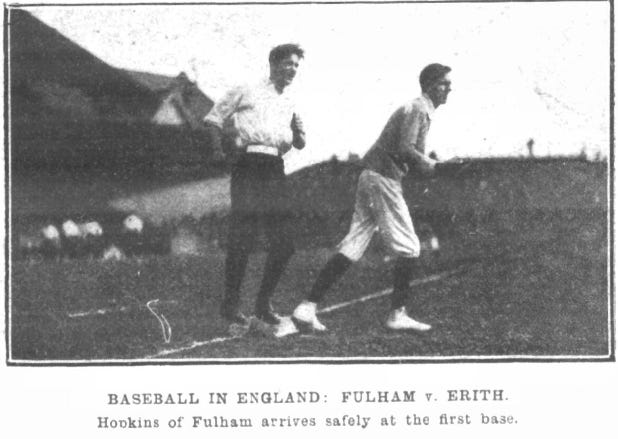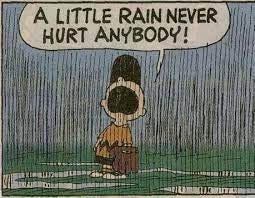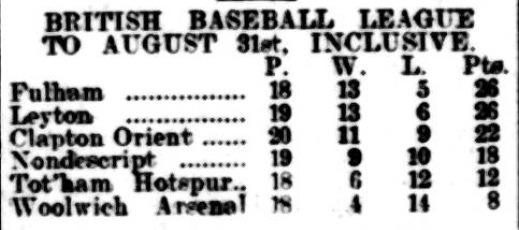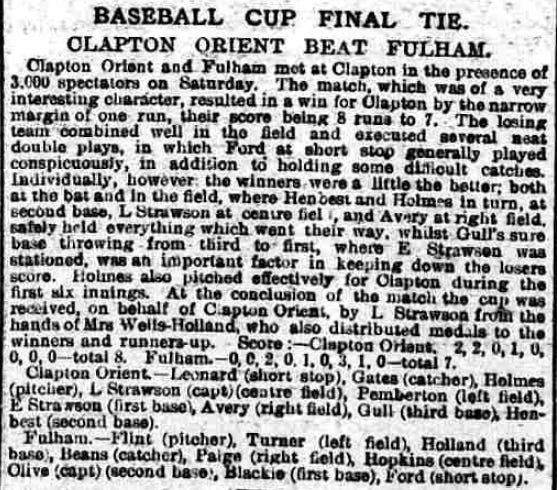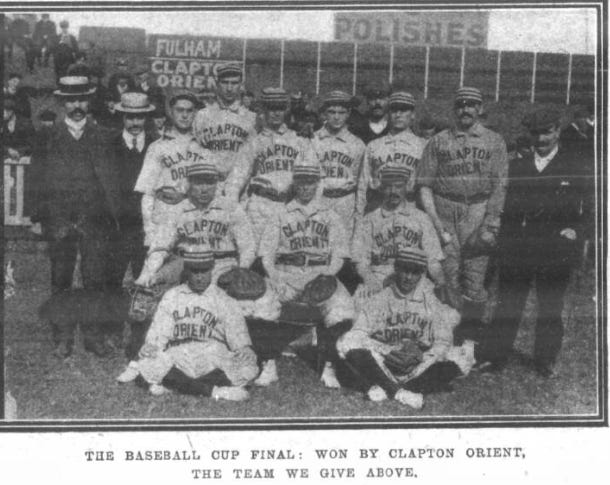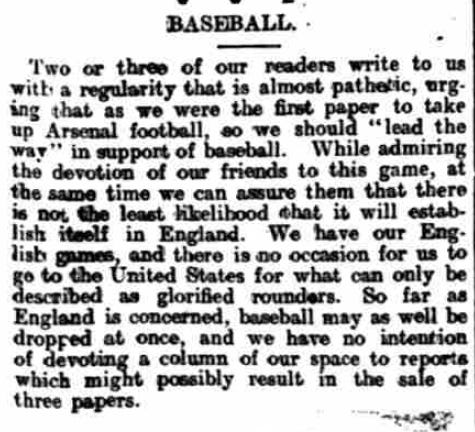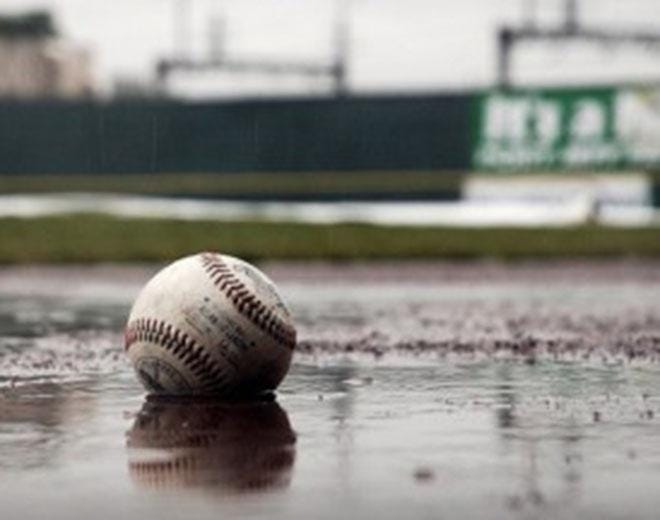1907: Football's baseball experiment meets British weather
Part five of the story of Arsenal's baseball experiment sees things go from bad to worse for the Gunners. I hope you've all got your brollies ready.
“Parson,” asked a flippant youth, “did they have baseball in ancient times?”
“To be sure. Jericho had a strong team and so had Nineveh. But there was one tribe that nobody could beat.”
“Who were they?”
“The Hittites. You should have known that much, young man.”
(How’s that for niche? Baseball meets the Old Testament in a 115-year-old daft joke. Sourced from the Louisville Courier-Journal, reproduced in the Hull Daily Mail, 24 September 1907.)
After the relative success of the British Baseball League’s inaugural season (see the full story in part 1, part 2, part 3 and part 4), the organisers expanded their ambitions in 1907 for the second campaign.
The league remained with the same six teams – Woolwich Arsenal, Tottenham Hotspur, Fulham, Clapton Orient, Leyton, and Nondescripts – but with twice the amount of games. Each team would play each other team twice at home and twice away. More games, more money, more fun all round.
As we will learn, however, the British weather was set to play a rather decisive role in the success of this idea.
As well as the six-team British Baseball League, a second league was formed with other London teams including Brentford and several reserve sides. Crystal Palace also had a baseball team and played several friendlies, but didn’t register for either competition, for reasons I’ve been unable to identify.
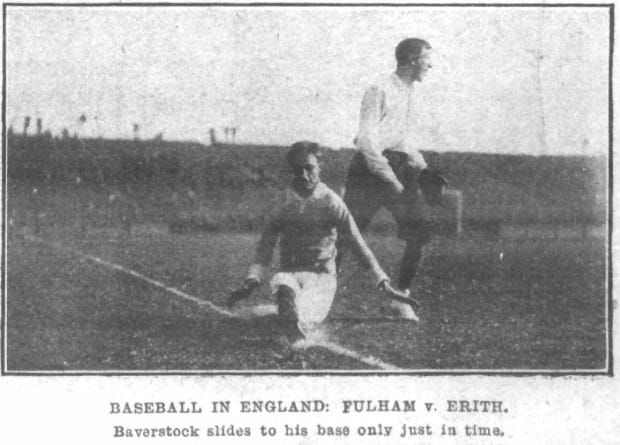
Let’s do it again!
The 1907 baseball season began on 4 May, with games scheduled for every Saturday through the summer. Double-headers were also scheduled for bank holidays, necessitating earlier starts and prompt train travel between games.
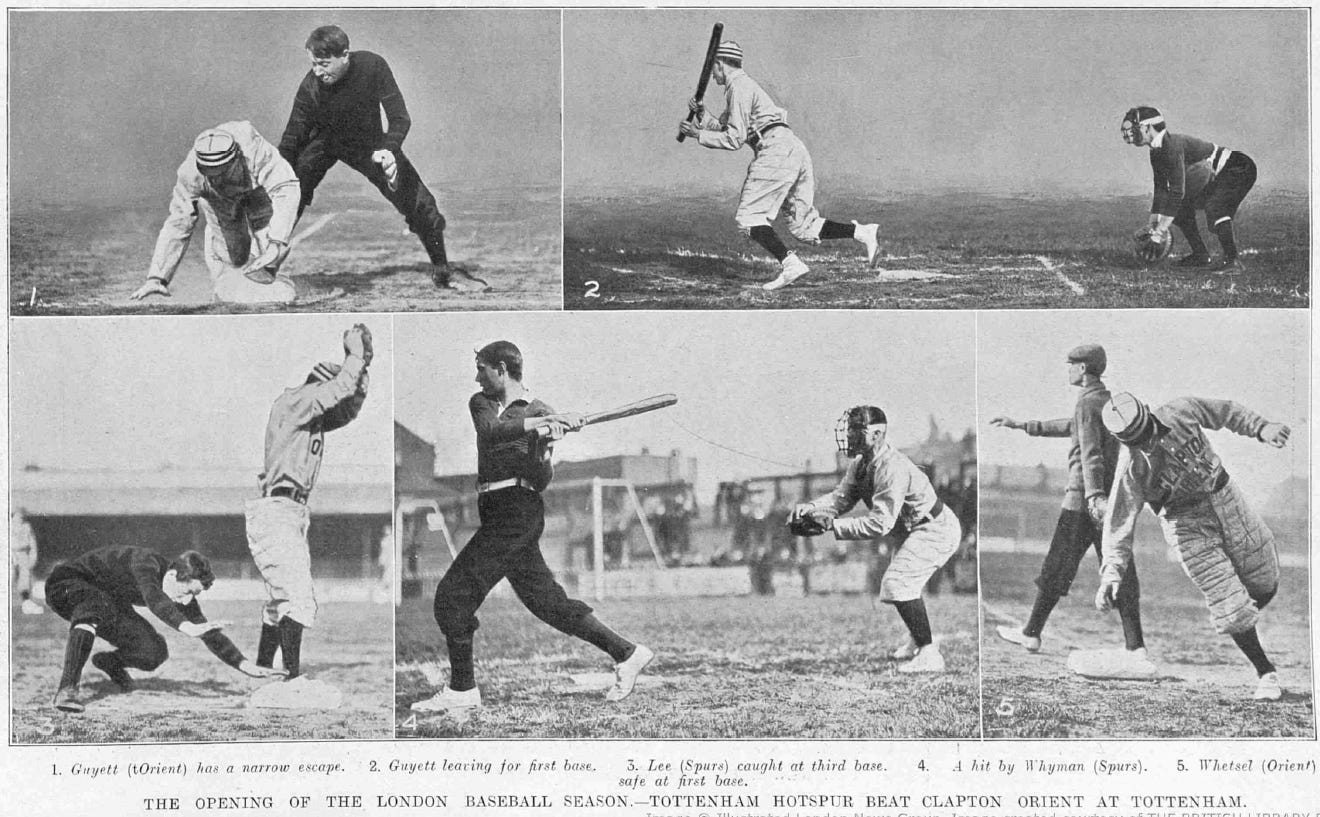
If Woolwich Arsenal were hoping to repeat their success of 1906 and challenge for the championship again, they were very quickly put in their place. A chastening opening day defeat to Fulham by 40 runs to 11 was followed up with a 36-2 spanking at the hands of Clapton Orient.
After the first game, the Woolwich Herald’s columnist ‘Referee’ had rather a lot to say about the inauspicious start to the season.
I watched the game as a novice; I criticised it as a cricketer; I deplored the home team’s loss; I enthused over Fulham’s clever tactics; and I came away with a desire to have a “shot” myself, even if my years are in excess of my discretion, and to try to instil some of the good qualities of the game into thise sport-loving souls whom I know, and those who know my by virtue of my notes only [i.e. this column].
First, a word of warning to the Arsenal Executive. If baseball is to be a success locally it must not be played by a “wooden legged” team. I refer to the home players.
It is no good pointing out to me, or to the public who pay to see games, that the players were unfit, that some of your best were unavailable, that this or that reason is the cause of a slipshod display that would not do credit to an average team of lads who play keen cricket, who can catch or field well and who know the value of good ‘tween wicket running. What must be done is only too plain, i.e., get men who can play the game well, and cultivate a desire to do ditto in some of the lads in the district.
(From the Athletic Notes column by ‘Referee’, Woolwich Herald, 10 May 1907.)
Ouch. How’s that for an early 20th century version of ‘my Sunday league team can do better than that’?
There is then a lengthy description of how baseball is played, littered with cricket terminology such as ‘bowler’ rather than ‘pitcher’ and ‘wicket keeper’ rather than ‘catcher’.
In the true spirit of the ‘commentator’s curse’, the writer then declares that one of the positive aspects of baseball is that there is “a 99 to 1 chance of the play being finished if weather permits”. As we’ll see, that’s a pretty big ‘if’ when you’re playing in England.
One phase of Saturday’s game showed me plainly what can be done. A runner was smartly put out at second base, the ball was instantly thrown to first base to which the striker was running. He also was put out cleverly and then from a fast return to the catcher or wicket keeper, the runner who started from the third base to reach the home base only just got home by the “skin of his teeth”.
(‘Referee’ describes a double-play, presumably from Fulham, in his Woolwich Herald column on 10 May 1907.)
The Sporting Life journalist was kind to the Woolwich Arsenal players after the Clapton Orient game, heaping praise on the victors while mentioning only that Arsenal looked “short of practice”.
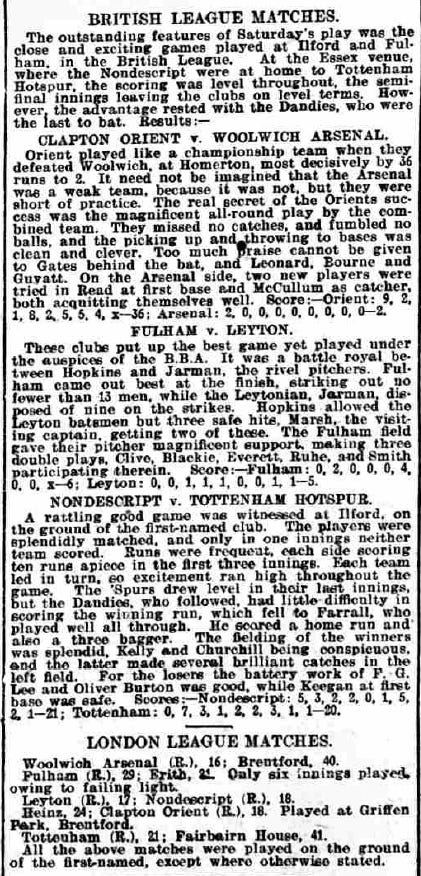
The Gunners didn’t get their first win until their fifth attempt on 20 May, a narrow 7-6 win over Leyton as part of a bank holiday double-header. The earlier game had resulted in another comprehensive defeat, 20-9 against Fulham.
Special mention to Brentford, who on the same May bank holiday walloped Heinz (presumably a works team) 62-8 in the London League, before beating Tottenham’s reserves 39-17. I make that 126 runs in two matches on one day.
After six rounds of games, the table showed a complete reversal of last year’s pattern. Woolwich Arsenal – top of the table and unbeaten after six games in 1906 – were bottom with just one win and several heavy defeats against them.
Nondescripts, the whipping boys of the 1906 season, were top with a 5-1 record and 10 points, two ahead of Fulham.
Umbrellas at the ready
And then, the rains came.
On 1 June, both the Leyton v Clapton Orient and Tottenham v Arsenal games were abandoned due to poor conditions. This was especially galling for the Gunners as they were 5-2 up when play was stopped, and hopeful of another win to improve their form.
Only Fulham’s game against Nondescripts managed enough play to reach a result, with seven of the scheduled nine innings completed (the minimum for a result to stand was five). Fulham won 10-6 to go level at the top.
Once again on 15 June two games were abandoned, and again one of them was Tottenham v Arsenal. Once again, Arsenal were ahead when play was stopped, this time 8-5. Only Leyton’s 10-3 victory over Nondescripts stood.
Another match on 29 June between Fulham and Leyton was called off due to inclement weather.
By this time, the organisers must have been starting to sweat a little about completing the fixture list. With the football season starting in September and cup games to fit in as well, they were already running out of time to reschedule games.
Midweek matches were difficult due to most players having to work (this was an amateur competition), and by the evening – even in the summer – poor light could make play impossible.
From later reports it seems some of the rescheduled games were squeezed in, but so far I have been unable to find records of them.
Regardless, the disruption did nothing to improve Woolwich Arsenal’s fortunes. When they finally managed to play Tottenham on 17 August, they were hammered 20-5. A game against Fulham on 24 August almost didn’t happen as the Arsenal players missed their train, meaning only the bare minimum five innings could be played. The Gunners lost 12-4 – it might be just as well they didn’t play any longer.
Arsenal saw out the season with an 18-17 victory over Clapton Orient on 31 August.
This appears to have been the final weekend of fixtures. With the first games of the new football season just a few days away, it seems the baseball league was essentially abandoned. According to a couple of different newspapers, this was the final table.
EDIT (1 Dec 2023): I’ve subsequently discovered, just after publishing this, that Fulham were awarded the championship on win average following a meeting of the league’s organisers, as a match between the top two was among those abandoned and never replayed.
Up for the Cup again
As far as the Baseball Cup was concerned, an expanded knockout competition was held this year. Erith and Brentford were invited to compete from the London League.
They may have wished they hadn’t bothered: Brentford were walloped 26-2 by Fulham, and Woolwich Arsenal achieved by far their best showing of the season with a 49-7 demolition job on Erith.
In the other quarter finals, Clapton Orient cruised through 18-4 against last year’s winners Tottenham, while Nondescripts squeezed past Leyton 11-10.
Woolwich Arsenal’s cup hopes were dashed by Orient in the semi-final with Clapton winning 17-3. Fulham had a similarly comfortable game against Nondescripts, triumphing 11-1.
The final, however, was much tighter.
With September’s arrival, baseball was quickly forgotten as football resumed.
‘Glorified rounders’
Woolwich Arsenal’s awful record on the field probably wasn’t helped by what happened off it. Attendances weren’t as high as expected and it wasn’t the money spinner Arthur Kennedy and the other directors envisaged back at the start of 1906.
It’s little wonder that attendances were poor when the local press - a key outlet for promoting sporting events - treated baseball with disdain, as this editorial from the Woolwich Herald demonstrates.
It’s obvious (with more than century of hindsight) that baseball was a poor and distant cousin to football. It was a niche sport, alien to many British sports fans and journalists. Despite the best efforts of a dedicated band of players and administrators, and the enthusiasm of a few sports writers, it just couldn’t hope to compete against the dominance of cricket and football as the national pastimes.
For the 1908 season, it appears that promotion and relegation were introduced and Arsenal dropped out of the British Baseball League, replaced by Brentford.
In the next chapter, we’ll explore the subsequent seasons of the British Baseball League, as Arsenal adjusted to life outside the top tier in an odd premonition of what was to come for the football team.





